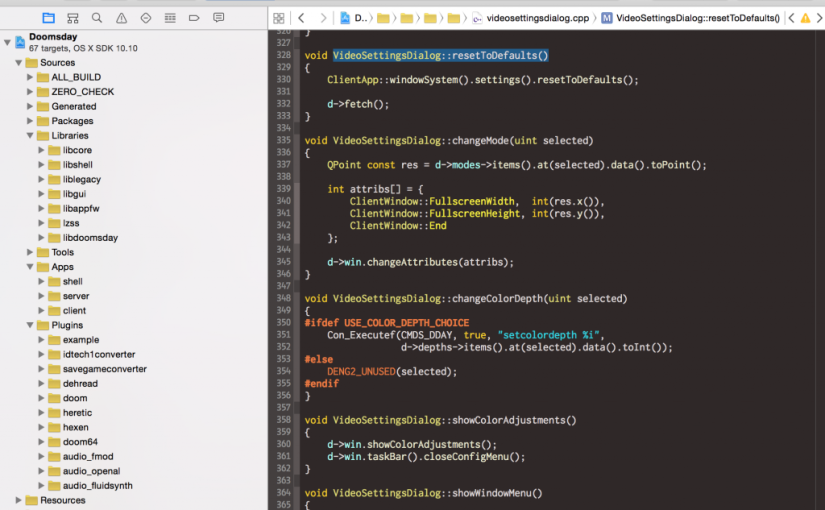I’ve been setting up CMake build files for Doomsday in the cmake-build branch. This has been quite an undertaking because Doomsday has about 50 individual components to build. (Mind you, some of those are tests and tools.) Not having done anything substantial with CMake in recent years, it was very useful to really jump into the deep end and get familiar with CMake version 3. While setting up the build for all the components on OS X, Windows, and Unix I gained a real understanding of CMake as a scripting language and now feel quite comfortable with how it operates. Continue reading C-Made
When it’s done
There are two popular ways to manage software releases: feature driven or timeboxed. In a feature driven project, each version commits to a predetermined set of changes and the release is done when everything has been finished. In a timeboxed project, releases are done based on calendar dates without committing to any particular set of features. The latter method is used for example by modern web browsers and Ubuntu.
We more or less followed the timebox method during stable releases 1.9.10–1.14, having a roughly three month release cycle for each version. However, during the 1.15 unstable builds the schedule was first extended and then continually delayed. It eventually became clear that we had abandoned the notion of timeboxing completely.
Pi the Successor
Upon hearing the news about Raspberry Pi 2, I was immediately interested: a quad-core processor? That could run four Doomsday multiplayer servers without breaking a sweat! I jumped into the web browser to place a preorder without hesitation.
I then remembered my trusty Raspberry Pi model B, which has been lying around unused of late. Perhaps I could employ it as an autobuilder client, to replace my old Mac Mini? Compared to a disk-spinning, fan-blowing Mac Mini, a completely quiet and tiny Raspberry Pi seems much better. Nowadays the Mac Mini has only been running nightly API documentation updates and other documentation generation tasks, so the relatively slow Raspberry Pi CPU shouldn’t be a problem.
Slow VM OpenGL performance
I sometimes do development work in a Linux virtual machine on my MacBook Pro. At some point in the past, OpenGL performance in this environment was at near-native levels. Recently, though, it seems performance has been bogged down significantly. Continue reading Slow VM OpenGL performance
Release notes
DaniJ agreed to continue looking into the Hexen save issue since he has more recently been working on that area of the code. This frees me up to work on secondary tasks, like writing the release notes. Continue reading Release notes
Hexen save woes
I’ve started investigating what could be wrong with Hexen savegames regarding the state of ACS scripts. Right now I’m feeling quite overwhelmed — this code is complicated, even convoluted. Particularly the ACS state is broken down into multiple parts: world state, map state, individual script states as thinkers, and deferred script run requests. Each part is saved and loaded separately.
Due to all the complexity, I’m not surprised we are having malfunctions. Continue reading Hexen save woes
Xcode trouble
Here’s one for future reference. I’ve been working with Xcode on and off recently, but today all of a sudden, Xcode decided that it couldn’t find any of the dependencies between the project’s apps and libraries. That is, when building Doomsday.app, it wouldn’t build any of the supporting libraries first which, of course, led to a failed build.
Up to Speed
I’ve been getting back to work on Doomsday after my 1.5 month hiatus.
As I previously planned, I’ve been doing more development on Xcode 6. It took a brief adjustment period to get to know the intricacies of the IDE, but Xcode is starting to feel quite comfortable. My biggest gripe is that the Quick Open box is so slow; Doomsday is a relatively large code base, so there are a lot of files and symbols to find (Qt Creator manages this just fine, though). There are some nice touches like the Assistant editor showing callers/callees, source/header counterparts, and other helpful information, but code navigation on the whole just doesn’t feel right to me. However, Xcode is superb for debugging on the Mac. I’ve already managed to fix a number of bugs thanks to it. Continue reading Up to Speed
Breather
I’ve been taking a break from Doomsday for the past two weeks, partly because I didn’t take a real break during the summer this year and partly because I haven’t had very much spare time recently.
It has been nice to think about some other things for a while, for instance taking a closer look at the C++11 standard and playing around with the more advanced features. With Doomsday there is a lot of inertia that prevents doing this sort of experimentation, because we have to make sure everything still compiles on all of the supported platforms.
I’ve moved the 1.15 Candidate phase and stable release forward to give us time to finish all our work for 1.15.
Oculus Rift DK2
While I’m still working on the 3D model renderer, I’m also updating Doomsday’s VR code for the Oculus Rift DK2. I’m posting about my progress on a thread in the dengine.net forums.
